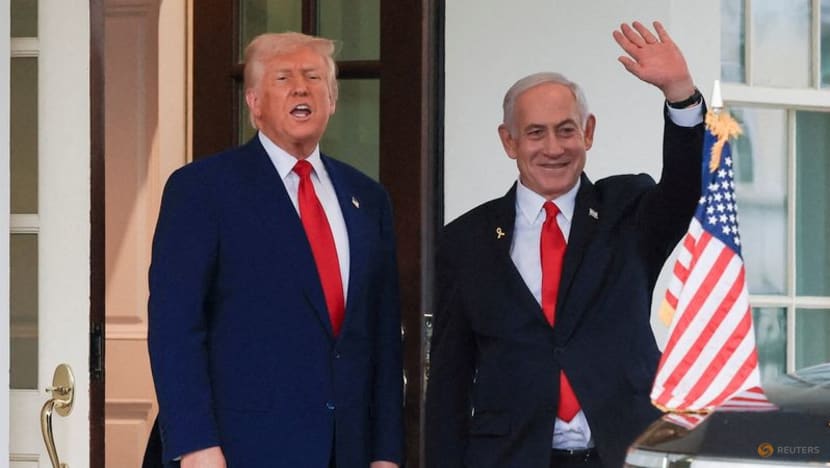Commentary: Netanyahu will do just enough for the idea of Gaza ceasefire to keep Washington in his corner
The pursuit of war is key to Israeli Prime Minister Benjamin Netanyahu’s political survival. Strikes in Gaza and Syria show there is some truth to this, says NUS Middle East Institute’s Clemens Chay.


This audio is generated by an AI tool.
SINGAPORE: As foreign leaders go, Israeli Prime Minister Benjamin Netanyahu is a regular at the White House. His visit in early July was his third in President Donald Trump’s second term – all of six months old – and followed the US strikes on Iran’s nuclear sites.
Basking in the afterglow of the assault, Mr Netanyahu seized the opportunity to further stroke Mr Trump’s ego by nominating him for the Nobel Peace Prize, for his “pivotal role” in negotiating the normalisation of relations between Israel and several Arab states.
But for all his flattery, Mr Netanyahu’s true objectives suggest peace is just about the last thing on his mind.
When it comes to Gaza and Iran, the Israeli Prime Minister is using creativity to balance both US interests and his own needs. Put simply, Mr Netanyahu will do just enough to support the idea of a ceasefire deal in Gaza and a nuclear deal with Iran, but the pursuit of war remains key to his political survival.
VIOLENCE CONTINUES
Despite Mr Trump’s optimism at the beginning of the month about a possible 60-day ceasefire deal between Israel and Hamas, an agreement has yet to materialise. Much was made of his demand on Truth Social to “make the deal in Gaza, get the hostages back”, but there was nary a whimper following Mr Netanyahu’s visit.
The last ceasefire, achieved by the joint efforts of both the outgoing Biden administration and the incoming Trump one shortly before the presidential inauguration in January, was broken by large-scale Israeli airstrikes 16 days after the first of a planned three-phase agreement.
The truth is that while Mr Netanyahu talks peace, Israeli strikes continue to pummel Gazans seeking aid, killing many and injuring even workers from the American-backed Gaza Humanitarian Foundation (GHF). These actions have coincided with an uptick in settler violence on the West Bank.
JUGGLING GAZA AND IRAN FOR SURVIVAL
This continuing cycle of violence is closely tied to Mr Netanyahu’s grip on power.
Almost two years removed from the security debacle that was the Oct 7, 2023 Hamas attacks, the Israeli prime minister’s domestic political standing has made an astounding recovery, due in large part to the successful military action against Iran – which even opposition figures such as Yair Lapid coalesced around.
But the far-right coalition he built is wobbling. Already, two ultra-Orthodox parties have quit his government over disagreements surrounding military draft exemptions.
One of the two parties, Shas, urged Mr Netanyahu to do “everything in his power” to reach a deal with Hamas – a statement which runs in stark opposition to the far-right’s desire for Israel to press on with the war, and one which exposes the limits of his high-wire juggling act.
Mr Netanyahu’s need for the right-wing elements in government to prop him up means that he will have to indulge in some of their ideas, however audacious they may be. One of the latest proposals includes the resurrection of the plan to relocate Gazans, but this time through a transfer of 600,000 Palestinians into a “humanitarian city” built on the ruins of Rafah, south of the enclave.
Much to his displeasure, however, the Israel Defense Forces (IDF) have warned that his plans risk budget overload, and the derailing of ceasefire and hostage release negotiations.
On the international front, meanwhile, Israel’s image has taken a battering. In late May, German Chancellor Friedrich Merz said in a televised interview that Israeli actions in Gaza “can no longer be justified by a fight against terrorism”. These remarks come from a country with a longstanding political commitment towards Israel following World War II and the Holocaust. On Monday (Jul 21), 28 countries, including Britain, France, and Australia, signed a statement warning that the “suffering of civilians in Gaza has reached new depths”.
With Washington in his corner, however, Mr Netanyahu continues to thumb his nose at the international community.

GOING DOWN UNCHARTED ROUTES
The pressure on Mr Netanyahu has led him to take Israel down some uncharted routes. Its strikes on Syria, under the pretext of solidarity with the Israeli Druze community, constitute a case in point.
Not only is he going against US support for regional stability, he is also exercising unchecked military power – a worrying sign for Arab countries in the region.
To be clear, the Syrian government was finalising a truce with Sweida’s religious leaders as the Israeli strikes carried on. But this presents complications for the nascent steps towards normalisation between both countries, not to mention its relationship with Washington as Mr Trump was reportedly “caught off guard” by the strikes.
Mr Netanyahu’s nomination of Mr Trump for the peace prize should be seen in this light: Washington has made clear it wants Tel Aviv to “stand down” when it comes to Damascus, but the Israeli leader is betting the house that he can navigate this particular obstacle course.
The next few months may offer more pathways for him.
A three-month parliament recess affords him some space to placate his fractious coalition. In Gaza, he has confirmed that Israel is arming clans in Gaza to take down Hamas.
In facing down what is perhaps the most serious threat to him – his ongoing corruption trial – he has a solid ally in the White House. Mr Trump, motivated by a sense of grievance against what he considers politically-motivated persecution against him, has rallied to the side of those he deems have suffered the same form of injustice.
He has lashed out at Mr Netanyahu’s trial, saying that Washington was not going to “stand for this”. In an unprecedented move, US Ambassador to Israel Mike Huckabee was in the gallery last week for a court hearing, and called the whole process “wrong”.
Observers have frequently said that warfare sustains Mr Netanyahu. In Gaza, and Syria, he has shown there is at least some truth to this. Iran remains in play, too. These conflict theatres anchor the Israeli prime minister’s divide and conquer policy – for his own political survival.
Clemens Chay is Research Fellow at the Middle East Institute, National University of Singapore.


















